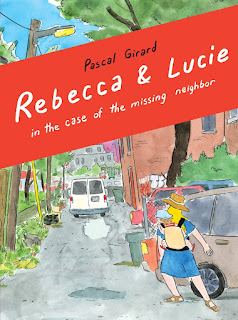The first book I saw of his was his deeply affecting memoir Nicolas, about his brother who died when they both were young. Since then he's also done books like Petty Theft, about a sad-sack adult Girard getting obsessed with a woman who steals his books, and Reunion, in which an equally sad-sack Girard obsesses badly about his tenth highschool reunion. In the spirit of honesty, I should also mention Bigfoot, which does not include a character named "Pascal Girard," but which likely draws on his life in less-obvious ways.
And his new book last summer, Rebecca & Lucie in the Case of the Missing Neighbor, also has a character named "Pascal Girard," clearly based on the author. But he's a secondary figure in this story - Girard continues his streak of making himself confused and out-of-the-loop here as well - in what he declares is a fictional story about his wife, Rebecca Lloyd, and their nine-month-old daughter Lucie, solving a local mystery.
Now, I have to admit that Girard is Quebecois, and works in French. So my view of his work is only what has been translated: that may be different from how French-speakers see his entire oeuvre. But it seems pretty central: Girard makes stories in which he appears, and in which he does not come off well.
He's very much secondary in Rebecca & Lucie: a good husband, sure, in his goofy half-distracted way, but not privy to what's going on in Rebecca's head. The copyright page says this is all fiction, except for one sequence about Lucie's birth, which was "written with the help of Rebecca Lloyd." I have to imagine Rebecca Lloyd at least kibitzed on the rest of the pages, the ones in which a fictional version of her runs around their neighborhood investigating a missing person.
Before the title page, we get a late-night sequence: Lucie wakes up, and Rebecca feeds her. She sees some kind of commotion in the alley behind their apartment, something being put in a white van that then drives away. She soon learns that a neighbor, Eduardo Morales, has gone missing, and, for whatever reason - boredom, feeling confined by her new all-encompassing role as "Lucie's mother," a sense of justice - she starts talking to people about it.
Like all the best amateur sleuths, she's dogged about it: Rebecca needs to know what happened, like a physical need. She goes to extreme ends - Girard has always been fond of the comedy of embarrassment, and that comes out here - all to find out the truth, and, eventually to punish the people she is sure are the real villains.
It's a mixture of amusing and low-key thriller, particular near the end, where Rebecca puts herself in physical danger. Girard starts slow, anchoring his story in the rhythms of a woman towards the end of her "mat leave" - exercise classes, errands, day-to-day life with a toddler. And as Rebecca learns more, and suspects vastly more than that, she gets more energized and obsessive.
I don't think this will turn into a series, but it could. Girard gives us a series springboard at the end, so we could see an annual "Rebecca & Lucie in the Case of something-or-other" if he and his publishers wanted to. That could be fun, particularly if he allowed Lucie to grow up at a normal rate - each book would have different taking-care-of-the-kid problems, and maybe we could see what Rebecca does for a living when she isn't on maternity leave.
But, for now and possibly for ever, this is a standalone. It's amusing, not quite as light as it first appears, and probably not the best for people who like serious mysteries with clues the reader has to work out and red herrings and multiple suspects and a big "you know why I've brought you all here" drawing-room scene at the end. This is a Pascal Girard mystery, which means it's about people who stumble as much as they walk confidently, who do things for reasons they don't entirely understand, who hide things from each other without thinking about it, who have good intentions but might not have a clear idea of how to make those intentions real.

No comments:
Post a Comment